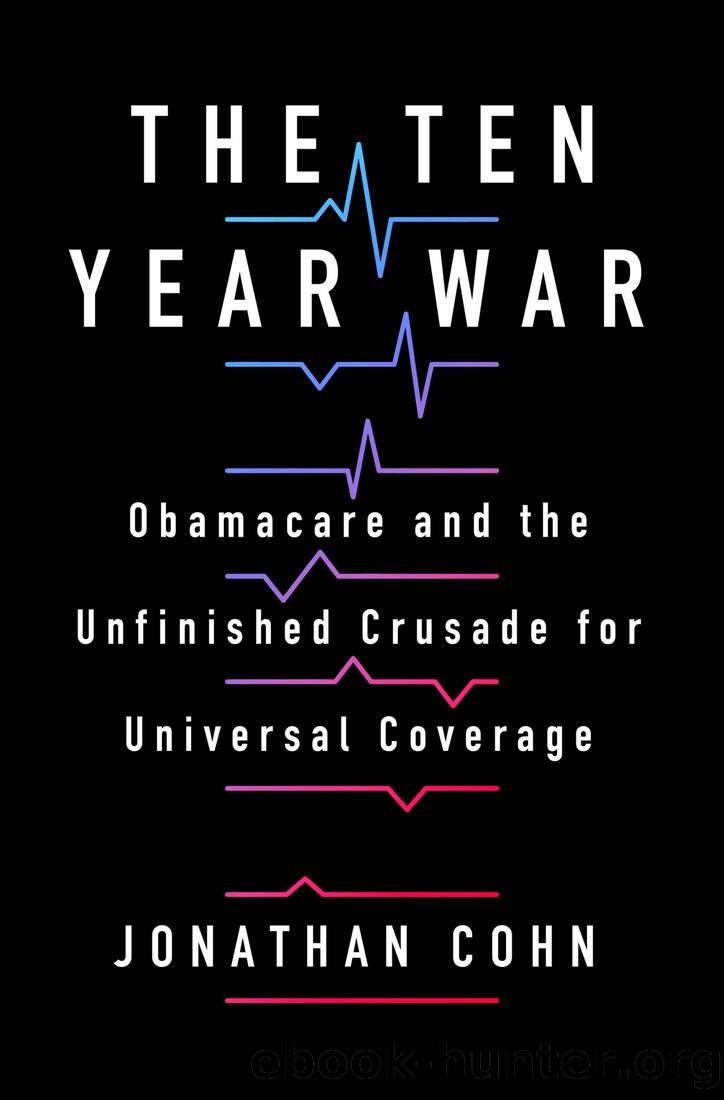The Ten Year War: Obamacare and the Unfinished Crusade for Universal Coverage by Jonathan Cohn

Author:Jonathan Cohn [Cohn, Jonathan]
Language: eng
Format: epub
Tags: political science, Public Policy, Social Services & Welfare, history, United States, 21st Century
ISBN: 9781250270948
Google: ddLtDwAAQBAJ
Publisher: St. Martin's Publishing Group
Published: 2021-02-23T00:01:58.676522+00:00
Twenty-one
Purification
1.
The first bill proposing to get rid of the Affordable Care Act got to the clerk of the U.S. Senate on March 23, 2010, right around the same time the first constitutional challenge landed in federal court. The billâs sponsor was Jim DeMint, the South Carolina senator who had hoped 2009 Tea Party protests would bring about Obamaâs Waterloo. The bill had twenty-two cosponsors, which was actually more than the total number of words in the legislationâs one-sentence text: âThe Patient Protection and Affordable Care Act, and the amendments made by that Act, are repealed.â1
Republicans in the House and Senate would file several more repeal bills in 2010, each one with roughly the same substantive content as DeMintâs. âRepeal and replaceâ was the partyâs official motto, but the bills were all repeal, no replace. The legislation was primarily a way to show voters, financial supporters, and sympathetic interest groups that Republicans remained inextricably opposed to Obamaâs health care reform effort. They would have to win back Congress to repeal it for real.
Republicans were calling it Obamacare by this time, and they used it to bludgeon vulnerable Democrats like Wisconsinâs Russ Feingold with television ads warning that the health care law would mean higher taxes and insurance premiums along with lower qualityâand that it would cut more than $500 billion from Medicare. The basis for that last claim was the lawâs reduction in Medicare payments, including cuts that Democrats had negotiated with the hospitals and other groups, to offset the cost of the coverage expansion.2
In reality, Democrats had gone out of their way to protect benefits for individual seniors. The one change retirees were likely to see and feel was extra help with prescription costs, because the Affordable Care Act would fill in the âdonut holeâ gap in Medicareâs drug coverage. But that would happen gradually, starting in 2011. Especially for voters exposed only to right-wing media, the argument about Medicare cuts validated suspicions that Obama and the Democrats were reducing benefits for hardworking Americans to finance a giveaway to other, less deserving parts of the population. Ron Johnson, the Tea Party Republican challenging Feingold, predicted that Obamacare âwill destroy our health care system.â3
On Election Day, Democrats took a âshellacking,â as Obama called it afterward, with net losses of six seats in the Senate and sixty-three in the House, more than enough to swing control of the chamber back to the Republicans. Pelosiâs reign as Speaker was over after just four years, and Obamaâs opportunity to pass major legislation was gone with it. He would spend the rest of his presidency on defense, not offense.
But something else had changed in the election. The Republican caucuses became more ideologically and temperamentally extreme.
In the House, the GOPâs leader was John Boehner, whose impassioned floor speech against the Affordable Care Act on the night of its passage remained an emotional lodestar for many of his colleagues. Later in 2010, rallying conservative voters, he vowed, âWeâre going to do everythingâand I mean everything we can doâto kill it, stop it, slow it down, whatever we can.
Download
This site does not store any files on its server. We only index and link to content provided by other sites. Please contact the content providers to delete copyright contents if any and email us, we'll remove relevant links or contents immediately.
Zero to IPO: Over $1 Trillion of Actionable Advice from the World's Most Successful Entrepreneurs by Frederic Kerrest(4574)
Machine Learning at Scale with H2O by Gregory Keys | David Whiting(4313)
Never by Ken Follett(3957)
Harry Potter and the Goblet Of Fire by J.K. Rowling(3860)
Ogilvy on Advertising by David Ogilvy(3624)
Shadow of Night by Deborah Harkness(3369)
The Man Who Died Twice by Richard Osman(3081)
Book of Life by Deborah Harkness(2939)
The Tipping Point by Malcolm Gladwell(2927)
Will by Will Smith(2920)
Purple Hibiscus by Chimamanda Ngozi Adichie(2858)
0041152001443424520 .pdf by Unknown(2846)
My Brilliant Friend by Elena Ferrante(2832)
How Proust Can Change Your Life by Alain De Botton(2815)
How to Pay Zero Taxes, 2018 by Jeff A. Schnepper(2655)
Hooked: A Dark, Contemporary Romance (Never After Series) by Emily McIntire(2556)
Rationality by Steven Pinker(2366)
Can't Hurt Me: Master Your Mind and Defy the Odds - Clean Edition by David Goggins(2342)
Borders by unknow(2315)
